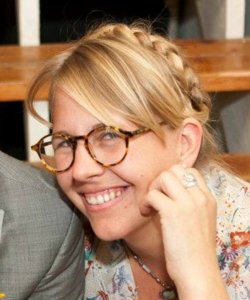
Kristen Koenig
Photoreception is a sensory tool that has driven neural development and evolution across the animal kingdom. This selective pressure can be inferred from the diversity of photoreceptive organs found across the Bilateria, including multiple examples of image-forming eyes. My interest is to better understand the morphogenesis of complex sensory systems and the single-chambered eye of the squid Loligo pealeii is an ideal organism to study this phenomenon. During Cephalopod development, the eyes are the first evidence of organogenesis in the animal and they are formed from two oval shaped placodes on either side of the embryo. A lip of cells forms along the periphery of the placode and moves over the placode, toward its center, closing like a “purse-string.” This process forms the optic vesicle. One of the remarkable advantages of studying Cephalopod eye morphogenesis is that placode internalization and vesicle closure occur on the exterior of the animal, making the whole process easily imaged in vivo. The squid Loligo pealeii holds monumental importance in the fields of neuroscience and cell biology at the Marine Biological Labs (MBL), and my previous work at the MBL has been an effort to continue this legacy. My aim is to establish the Loligo pealeii as a model for complex-eye development. This work is significant because it will be the first in-depth, in vivo analysis of neurodevelopment in any Cephalopod species.
